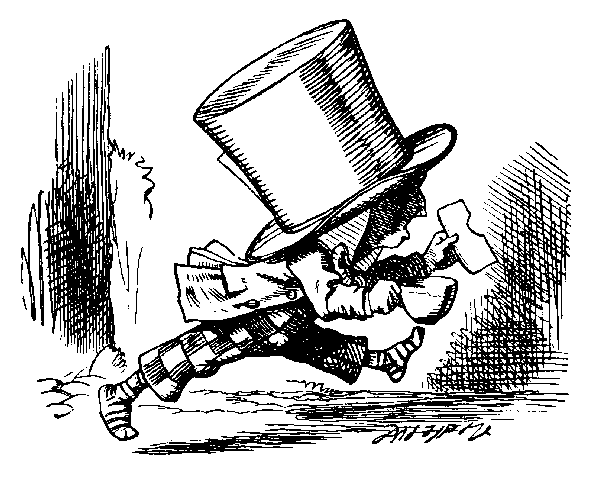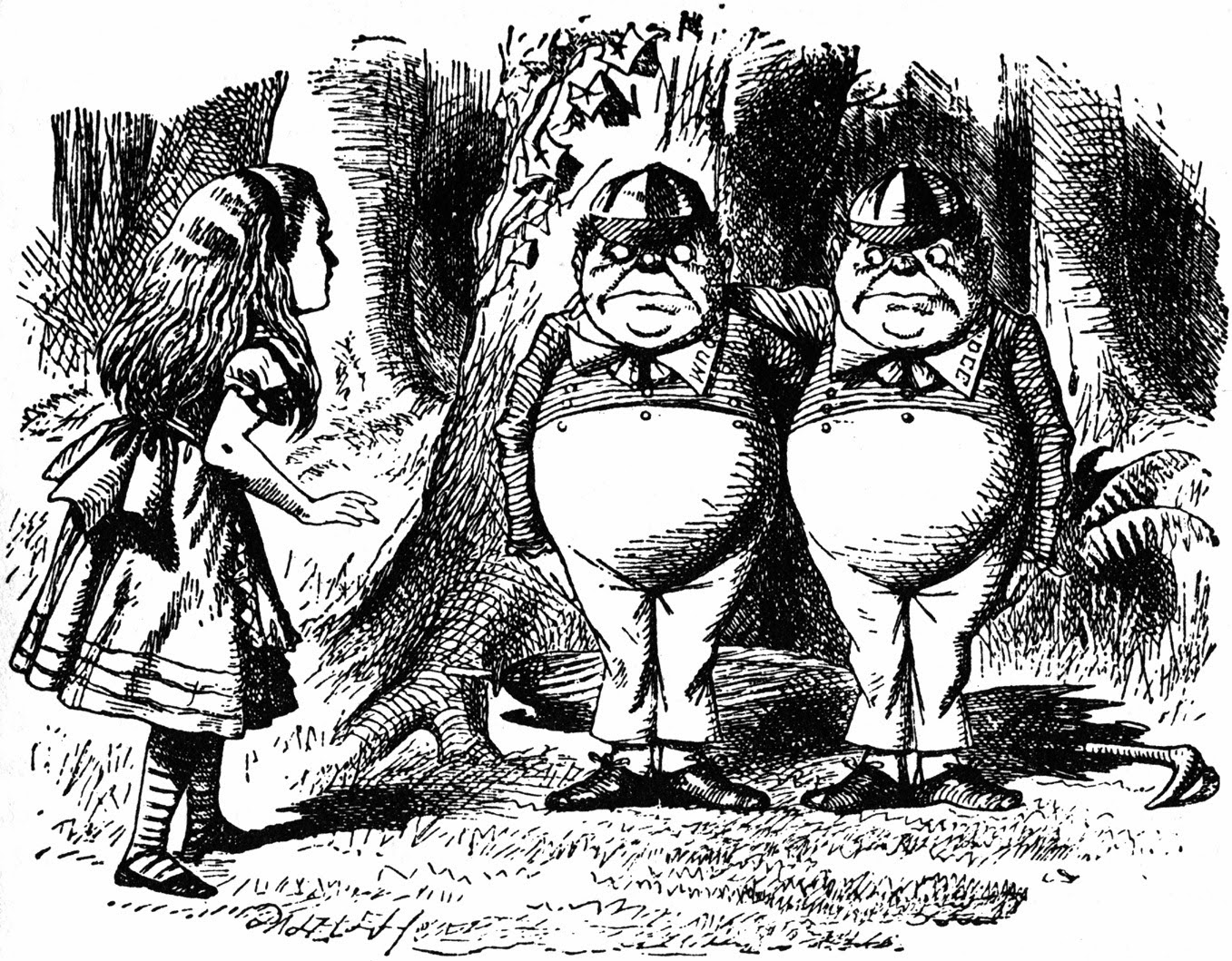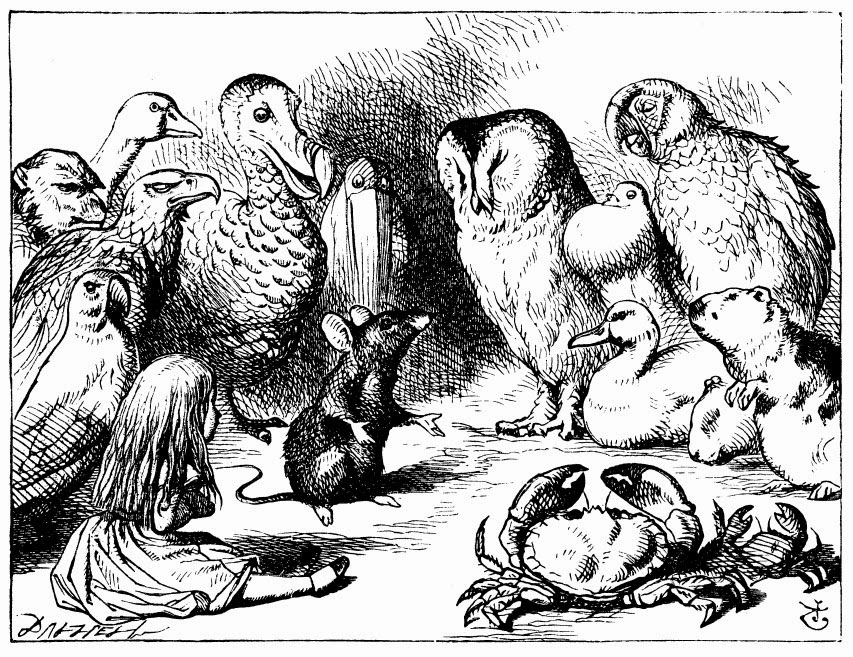Academics in Wonderland
By Daniel Greenfield
SultanKnish.Blogspot.com
The study of any philosophy is doomed eventually
to the solipsism of the idea as the real world falls
away and is replaced by the construct of the world.
When Buckley favored being governed by the first
2,000 people in the Manhattan phone book than the
faculty at Harvard, he was on solid ground.

The first 2,000 people in the phone book, good or
bad, are more likely to live in the real world than
in some strange construct of the real world. And
that experience will endow them with some sense of
how things actually work. Some of the faculty of
Harvard may live in Manhattan, but it is an
imaginary Manhattan whose social and economic laws
differ drastically from those of the world.
Academics are good at theory, not just the theory of
riding a bicycle as opposed to the physical act of
riding one, but of inhabiting a universe entirely
based on that theory. An academic can create a
theory in which bicycles cannot be ridden or in
which cars have no mass and exist indefinitely in
that world. If his theory is trendy enough, if he
recruits enough students who become faculty who
recruit more students into his peculiar world, the
theory will spill over into the real world and begin
to affect it.
Some insane obsessions that can exist only in
academia stay there. The taxpayers finance them, but
they rarely have to hear about them except when a
tabloid looking for a few inches of column outrage
reveals how many millions are being spent on studies
on why lesbians drink too much or a professor who
has spent his entire career writing papers on the
gay subtext of Sears catalogs from the 1950s.
Others don't stay there. Our modern obsession with
racial subtext is largely the work of academics.
Sociology has done more damage to American society
than crack cocaine, economists who make a living
telling government officials that money can be
printed infinitely are a political disease and
anything to do with the climate has been so
thoroughly contaminated with bad motives and bad
science that it might as well involve JFK
assassination or moon landing conspiracy theories.
Americans got used to the idea that academia was an
eccentric place full of wacky professors who
occasionally came up with brilliant ideas. This was
a convenient myth to cultivate because it obscured
the more problematic fact that outside the sciences,
the professors were rarely brilliant and their
eccentricity wasn't an individual habit, but a
collective political reality distortion field.
Even setting aside the influence of the left, the
fields that were meant to serve as storehouses of
knowledge and learning instead became wonderlands of
strange theories that came to life and took them
over until the fields no longer studied anything
real, but only found ways to sort facts from the
real world into their theory world.
American Studies, now on the receiving end of a good
deal of unexpected attention after its clumsy
boycott of Israel, has very little to do with
studying America and a great deal to do with
academics studying a world made out of their own
theories that has as much in common with America as
Wonderland had with Dodgson's Oxford.
Academia has become an alternate world where human
relations exist in a mechanical universe governed
entirely by identity politics, where the world is
always on the verge of a Green Apocalypse and the
only way to make anything work is to route it
through the foundational theories of existence. This
magical world continually changes in response to new
theories bubbling up from trendy publications. The
very laws of the universe can be gendered and every
historical event can be rewritten by viewing it
through the lens of class.
Academia is a magical world where nothing is truly
fixed and everything exists on belief. Change the
belief and you change the reality. It's a meta-world
that has a certain fanciful appeal for
intellectuals, but little relevance to the real
world where things do not change because the theory
does and where outcomes are hard and real and the
consequences of a bad theory can mean lives lost.

The behavior of literary characters can allow for
endless perspectives, because they are both human
and unreal. Economics however cannot be as
infinitely elastic. Nor can any more practical
field. And the infinite elasticity of literary
reinterpretations is destructive because it turns
the interpretation into the center of the story. The
work becomes secondary and the perspective becomes
primary. The words of Twelfth Night fall away and
are replaced by an academic's clever perspective on
it instead.
But it seems churlish to complain about something as
wholesome as that when Twelfth Night, Shakespeare,
English literature, the Western Canon and the
written word have long ago ceased to exist as
anything other than footnotes and references in a
paper on not merely gender, class or race, but some
perspective on a theory on all three. It's Alice in
Wonderland's rabbit hole and the only thing on the
other end is more of the same. It's Academics in
Wonderland all the way down.
Academia is dedicated to its own theories. The real
world is a reference point in an unreal world the
way that an inhabitant of Plato's cave might point
at the shape of a shadow as evidence in a ghost
story that he is busy telling. And it might be
fitting to leave the lunatics in this very expensive
asylum if academia had not long ago begun calling
the shots in the real world.
Every society needs ideas and those ideas rarely
come from politicians, generals and CEOs. The men at
the top are good at getting to the top. They're
usually not as good at coming up with things to do
once they're there except listen to their favorite
experts who are usually leaders in the field of
being experts who have their own experts whom they
listen to and so on, like Swift's fleas, ad
infinitum.
There's a reason that Obama has recycled many of the
policies of the Clinton and Bush administrations.
It's because unless a little fairy from the Center
for American Progress whispers a policy proposal
into his teleprompter, he has no idea what to do
next except take another vacation. The Center for
American Progress fairy gets its ideas from a bunch
of reprocessed papers that culminated in a book
whose bad ideas were simmering in academia for
decades beforehand.
Thus the lunatic idea from a paper that is written
entirely in unreadable Marxist gibberish and
dismissed as irrelevant by any sane person is
dressed up, popularized and taken around town by
people who know how to translate its specialized
language into something readable by the sort of
people who will then turn it into dishonest slogans
and market the whole thing as sound common sense
that we ought to adopt right now to invest in our
future and save our children.
What we have developed is a production process that
takes the gibberings of a lunatic hermit in a cave
and slowly translates them by a series of
interpreters into convincing speech that capture the
consciences of kings. The process is part
Marxism-Leninism and part Madison Avenue and as a
result of it we have a country that runs as well as
any university-- that is badly, in debt and
delusional.
The insane are leading the blind off a cliff that
the blind can't see and that the insane insist isn't
there.
Our ideas of how society ought to run come from
people who live in an imaginary world, but who are
at the center of systems that make their ideas seem
sensible and workable with tricks of propaganda. The
United States of America would not only do better
being governed by the first 2,000 names in the
Manhattan phone book, all of whom happen to be
Adams, but by people who believe that we are being
abducted by space aliens or that the pyramids were
spaceships so long as they were able to confine
their eccentricity to that one area, and dwell
otherwise in a real world of hard realities.
Academia tells us how everything ought to be, based
on their foundational theories, with little regard
for how the world is. Incompatible results, whether
in climate science or social sciences, are buried
and suppressed, ridiculed away or blamed on the big
business boogeyman or Ronald Reagan. There is no
honest attempt to engage with any of the disasters
left behind or any of those coming up ahead.

And that's the attitude for fields where there
are actually results. These are the exceptions, not
the rules. Much of what passes for academia now no
longer has results or any external context. There is
an internal structure of ideas and rules with little
relation to the outside world. There are no results
to be had from running everything through the
broken photocopier of race, class and gender, not
only because it's a childish waste of time, but
because it's not the thing itself that is of
interest but the lens.
Academia has become a world of lenses, a vast
optometrist's office with no patients, a telescope
that sees the flaws in its lens when it thinks that
it's looking at Martian canals and builds up an
entire tale of a dying Martian race on a planet that
is running out of water and then, even when the
probes have shown that the canals do not exist,
moves that tale over to earth and warns that global
warming will turn Earth into another Mars or Venus
and builds an entire theory based on an imaginary
catastrophe.
The lens everywhere has become more important than
the thing being looked at. Things are knowable facts
and so not very interesting. A rock will eventually
prove to be a rock. A word will have a meaning. But
a theory, a lens, a perspective is an eternal joy
because it can be reconfigured and played with
endlessly, like magic it can be waved over
everything to transform the real world into an
academic wonderland where nothing has substance and
everything can change on a whim.
Academia has become the endless voyage into an
imaginary world with no thought of destination.

